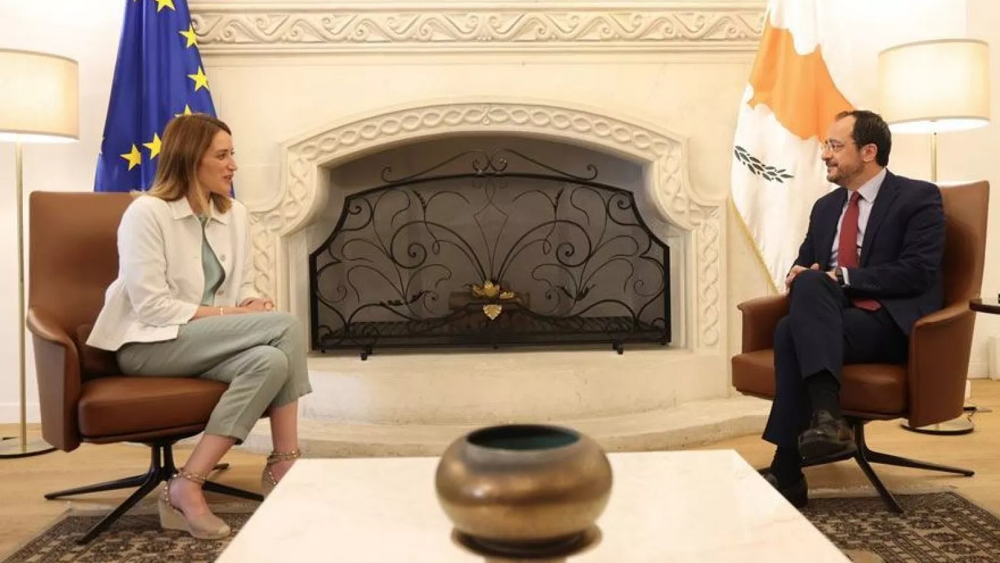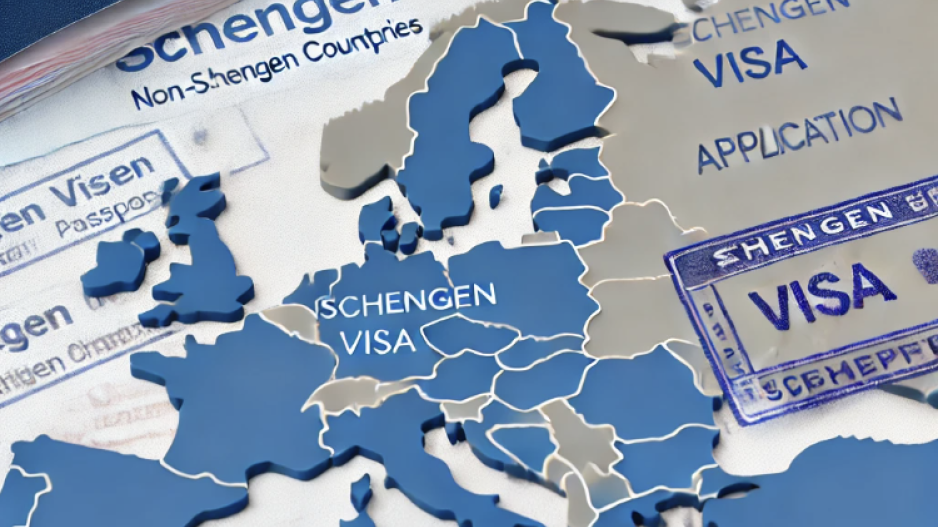Schengen, Repeated: How Cyprus Keeps Promising What It Can’t Deliver (Yet)
Presidents have pledged, deadlines have passed, and now 2026 is the new target — but can Cyprus finally overcome its political and territorial roadblocks?
President Nikos Christodoulides has pledged that Cyprus will join the Schengen Area in 2026, asserting that all necessary technical steps will be completed by the end of 2025. According to Christodoulides, a "tremendous effort" is already underway to ensure Cyprus is ready — an objective he had publicly committed to during his election campaign.
The President frames Schengen accession as a strategic goal for both Cyprus and the European Union. In a recent meeting with the President of the European Parliament, he emphasized the symbolic significance of 2026, which marks 40 years since the Schengen Agreement — “We are counting on your support to achieve this strategic goal for Cyprus and for the EU,” he said.

In the photo, European Parliament President Roberta Metsola meets with President Nikos Christodoulides at the Presidential Palace (May 2025), where the Cypriot leader reiterated his goal of having the country join the Schengen Area by 2026.
The message is clear: this time, the government promises that Cyprus really will join Schengen. Expectations are high that Cypriots will finally be able to travel within Europe without passports or checks — like their fellow EU citizens. “This is not just a wish, but a national commitment,” Christodoulides declared.
But for seasoned observers, the déjà vu is hard to ignore. This is not the first time a president has made such a promise.
The idea of Cyprus joining Schengen has appeared in the rhetoric of nearly every president since the country joined the EU. Some approached the subject cautiously, others more assertively — but none have delivered.
Tassos Papadopoulos (President 2003–2008):
After Cyprus joined the EU in 2004, Papadopoulos's government chose not to proceed with joining the Schengen Agreement. Officially, the government cited a need for preparation — “We requested a delay because we were not ready.” In truth, the main concern was clear: Schengen accession would require defining Cyprus’s external borders, effectively institutionalizing the Green Line as an EU frontier. This implied internal border controls — a politically unpalatable move while the Cyprus problem remained unresolved. Thus, like Ireland, Cyprus secured an exemption from Schengen at the time of accession.
Demetris Christofias (President 2008–2013):
During Christofias's tenure, the Schengen issue remained dormant. His administration focused on peace negotiations, avoiding any steps that would formalize a hard border on the island. In fact, until 2019, no Cypriot president had submitted a formal application for Schengen membership — precisely because doing so would require border control infrastructure along the Green Line, as if it were a border between states.
Nicos Anastasiades (President 2013–2023):
A turning point came during Anastasiades’s presidency. Amid growing irregular migration via the north and EU pressure for tighter controls, his government reopened the Schengen file. In September 2019 — for the first time since EU accession — Cyprus submitted an official application for Schengen membership. Anastasiades elevated the issue to a top political priority, presenting Schengen accession as a tool to manage migration and bolster national security.
The EU evaluation process was launched, assessing Cyprus’s readiness across six domains — data protection, police cooperation, border management, repatriation systems, visas, and more. According to Cypriot authorities, five of the six areas have since passed the evaluations. A milestone was achieved in July 2023, when Cyprus gained access to the Schengen Information System (SIS II) — a crucial pre-accession step enabling real-time data sharing on security and law enforcement.
But despite technical progress, Cyprus remained outside Schengen. At the end of Anastasiades’s decade in power, membership was still elusive. In 2021, the EU made its position clear. “Cyprus is not yet ready,” said EU Commissioner Ylva Johansson, citing the island’s unique political circumstances. The de facto division of the country, and the inability of the Republic to control its full territory, remained key barriers.
Nikos Christodoulides (President 2023–present):
Now President, Christodoulides — the very Foreign Minister who orchestrated the 2019 application — is trying to bring closure to the long-running saga. He entered office with a promise to finalize Schengen accession and soon after announced the 2026 target. A dedicated interministerial “Schengen Task Force” was established to fast-track unresolved issues. His Foreign Minister, Constantinos Kombos, called full accession a “top priority” and “mutually beneficial” for both Cyprus and the EU.
The narrative remains centered on security and migration, but also introduces symbolic European integration as a key selling point. “Accession would be a strategically significant development for both the Republic of Cyprus and the EU,” the President stresses. The bar has been set — publicly. The question remains: will this promise be fulfilled or become yet another entry in a long list of missed deadlines?
A Greek Cypriot police officer at the Agios Dometios checkpoint in Nicosia. The prospect of Cyprus fully joining the Schengen Area raises concerns that the crossing points along the Green Line could become “hard” external borders of the EU—something successive leaderships have long sought to avoid.
The core obstacle remains unchanged: Cyprus’s de facto division. Although an EU member since 2004, Cyprus does not control all of its territory. The Green Line — the UN-patrolled buffer zone separating the government-controlled south from the Turkish-occupied north — creates a unique legal and political challenge. Schengen membership requires full control of a state’s external borders. As Commissioner Johansson bluntly put it: “Cyprus cannot effectively guard its borders because of the Turkish invasion and the Green Line.”
This is why Cyprus never pushed for Schengen membership after joining the EU. Doing so would have meant establishing border posts along the Green Line — symbolically and practically reinforcing the island’s division. Under Protocol No. 10 of the 2003 Accession Treaty, the acquis applies to the whole island but is suspended in areas not under effective control of the government.
Today, the Green Line is not considered an “external border” of the EU, and is governed by its own special 2004 regulation. However, full Schengen membership would require treating it as an external frontier — a move seen by many as cementing the island’s partition.
The implications of Schengen accession without a Cyprus solution are raising concerns. Greek Cypriot officials fear hardened internal borders; Turkish Cypriot voices warn of new restrictions. Mine Atli, international secretary of the Turkish Cypriot Communal Democracy Party, recently warned that full accession could create barriers for thousands of Turkish Cypriots — especially those without Republic of Cyprus passports. These individuals would suddenly face “third-country” status, likely needing visas or facing passport controls.
Such a development would deepen the divide, both symbolically and materially. As lawyer and 2023 presidential candidate Achilleas Demetriades put it, rushing into Schengen “risks taking Cyprus one step closer to permanent partition.” Other analysts suggest Cyprus could negotiate exceptions or transitional rules to safeguard Turkish Cypriot movement — but the EU is unlikely to accept loopholes in Schengen security.
In the end, Cyprus’s Schengen bid is a marathon of obstacles. Time and again, presidents claim the finish line is near. Yet Cyprus remains one of only two EU states outside Schengen — the other being Ireland. The reasons are not technical. They are political.
And so, skepticism reigns. How many times have Cypriots heard the promise of passport-free travel to Europe? In 2019: “We are in the final stretch.” In 2021: “Not ready due to the Green Line.” In 2023: “The final miles.” Now, 2026 is the new target.
Until then, Cypriots would be wise to keep their passports handy — along with a healthy dose of doubt toward grand declarations.






